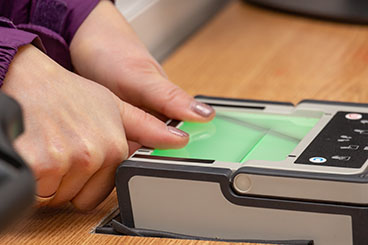Fingerprinting Requirements
Effective January 1, 2021, all new architect license applicants will be required to submit fingerprints for licensure. Senate Bill 608 (Glazer, Chapter 376, Statutes of 2019) requires the California Architects Board (Board) to obtain fingerprints from license applicants for purposes of conducting criminal history record checks. (More information can be found at Business and Professions Code (BPC) §§ 144, 5552.1.) The fingerprints will be sent to the California Department of Justice (DOJ) to search for the applicant’s federal and state criminal records, which may be used as grounds for license denial.
Applicants who reside in California must complete the electronic Live Scan fingerprint process. Applicants residing outside of California may either travel to California to complete the Live Scan process or obtain hardcopy fingerprint cards from their local law enforcement agency. However, submission of hardcopy fingerprint cards can take significantly longer to process.
All costs associated with meeting the fingerprinting requirement are the responsibility of the applicant. For applicants who are fingerprinted in California through the Live Scan process, the cost is currently $49, plus an additional Live Scan “rolling” fee paid at the Live Scan location. The rolling fee varies by Live Scan location and is not set by the Board. For out-of-state applicants, fingerprint rolling and cards are usually available at a local police or fire department. The applicant will complete the fingerprint rolling and card and submit them directly to the California DOJ along with a $49 payment. Detailed instructions on the fingerprinting requirements will be provided to each applicant upon applying to take the California Supplemental Examination.
The Board must receive state and federal criminal history records for all applicants prior to their licensure. If the Board receives criminal conviction history for an applicant, the Board will review the record, including conviction dismissal or expungement documents, to decide whether to issue or deny the license. Denial of a license is permitted when the Board determines that a criminal conviction is substantially related to the qualifications, functions, or duties of the business or profession for which the application is made. To make this determination, the Board also evaluates the applicant’s rehabilitation since the conviction. If an application is denied due to the criminal history, the applicant has the right to appeal the denial. (More information can be found at BPC §§ 480, et seq., 5577, and Cal. Code Regs., tit. 16, §§ 110, 110.1.)
The Board will also maintain a web page to provide guidance and answer frequently asked questions regarding the new fingerprinting requirements.

